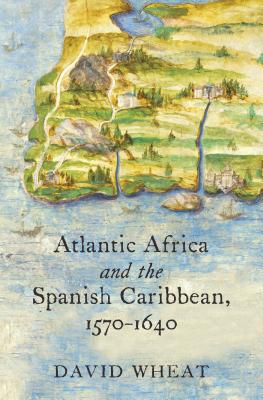Atlantic Africa and the Spanish Caribbean, 1570-1640

Atlantic Africa and the Spanish Caribbean, 1570-1640
This work resituates the Spanish Caribbean as an extension of the Luso-African Atlantic world from the late sixteenth to the mid-seventeenth century, when the union of the Spanish and Portuguese crowns facilitated a surge in the transatlantic slave trade. After the catastrophic decline of Amerindian populations on the islands, two major African provenance zones, first Upper Guinea and then Angola, contributed forced migrant populations with distinct experiences to the Caribbean. They played a dynamic role in the social formation of early Spanish colonial society in the fortified port cities of Cartagena de Indias, Havana, Santo Domingo, and Panama City and their semirural hinterlands.
David Wheat is the first scholar to establish this early phase of the Africanization of the Spanish Caribbean two centuries before the rise of large-scale sugar plantations. With African migrants and their descendants comprising demographic majorities in core areas of Spanish settlement, Luso-Africans, Afro-Iberians, Latinized Africans, and free people of color acted more as colonists or settlers than as plantation slaves. These ethnically mixed and economically diversified societies constituted a region of overlapping Iberian and African worlds, while they made possible Spain's colonization of the Caribbean.
PRP: 371.54 Lei
Acesta este Prețul Recomandat de Producător. Prețul de vânzare al produsului este afișat mai jos.
297.23Lei
297.23Lei
371.54 LeiIndisponibil
Descrierea produsului
This work resituates the Spanish Caribbean as an extension of the Luso-African Atlantic world from the late sixteenth to the mid-seventeenth century, when the union of the Spanish and Portuguese crowns facilitated a surge in the transatlantic slave trade. After the catastrophic decline of Amerindian populations on the islands, two major African provenance zones, first Upper Guinea and then Angola, contributed forced migrant populations with distinct experiences to the Caribbean. They played a dynamic role in the social formation of early Spanish colonial society in the fortified port cities of Cartagena de Indias, Havana, Santo Domingo, and Panama City and their semirural hinterlands.
David Wheat is the first scholar to establish this early phase of the Africanization of the Spanish Caribbean two centuries before the rise of large-scale sugar plantations. With African migrants and their descendants comprising demographic majorities in core areas of Spanish settlement, Luso-Africans, Afro-Iberians, Latinized Africans, and free people of color acted more as colonists or settlers than as plantation slaves. These ethnically mixed and economically diversified societies constituted a region of overlapping Iberian and African worlds, while they made possible Spain's colonization of the Caribbean.
Detaliile produsului









